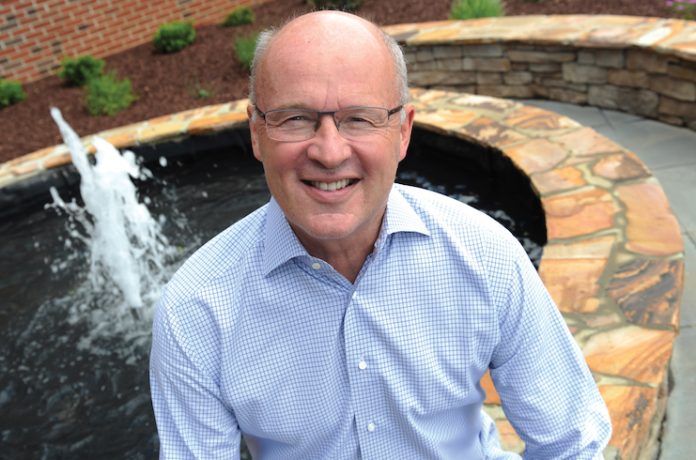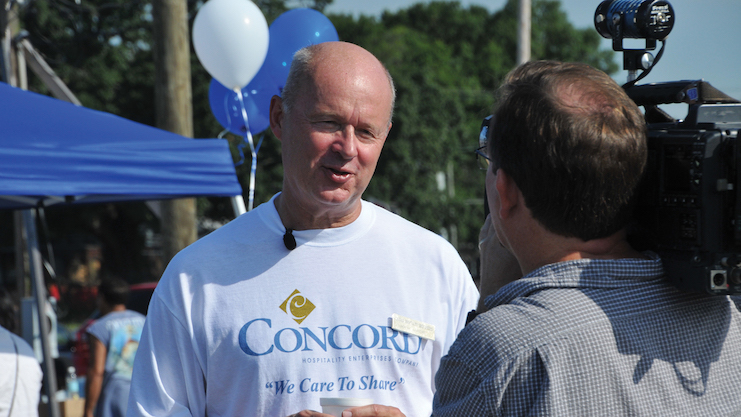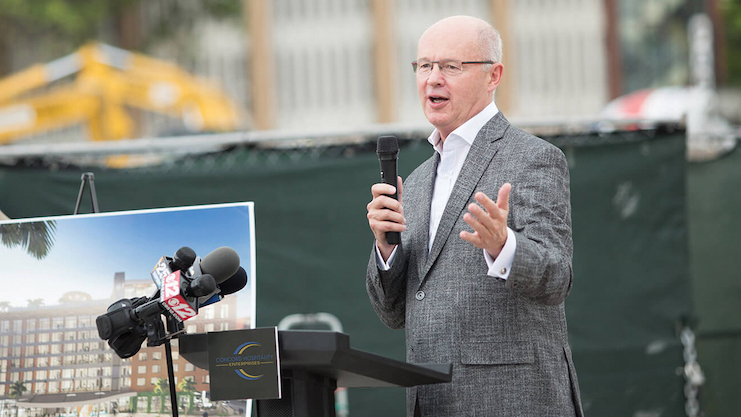
President and CEO Mark Laport founded Concord Hospitality Enterprises Company in 1985 as both a hotel management and development firm. He recently shared with LODGING how he—like so many others—stumbled into hospitality and then proceeded to build what is now one of the largest hospitality companies in North America, with hotels in both the United States and Canada. His ascent reflects his natural entrepreneurship (what might be called “hospitality DNA”), an abundance of hard work and determination, plus the ability to attract and retain talent. Those qualities, combined with an aptitude for locating, developing, and operating hotels in niche markets, have been crucial to Concord Hospitality’s sustained growth.
From Science to Startups
Laport had been a basketball player in high school and college, where he majored in biology and chemistry. Ultimately, he chose to apply his analytical thinking skills largely to entrepreneurial pursuits, not a career in science. He traces a path full of twists and turns, including stints as a builder of small residential homes and owner of both a general insurance agency and a restaurant.
Describing his formal entry into hospitality, Laport recalls catching the eye of a group of Holiday Inn franchisees he met while serving as president of the Chamber of Commerce in Girard, Pennsylvania. “What they mostly saw in me was that I was a hardworking, striving, and ethical young businessman,” he says. “Although I knew about risk management through ownership and management of a general insurance company and food & beverage from my restaurant, I knew almost nothing about the hotel business when they asked me to join theirs.”
Laport threw himself into the opportunity to step directly into management, working in all the departments, and learning all he could. He was especially interested in development and had his eye on the Hampton Inn brand, which was new at the time. However, the owners did not initially reveal to him that they planned to sell their five Holiday Inns, not grow their business. Still, in the process of helping them operate and then sell their properties, Laport became hooked. “I found that I loved the business: it was exciting, it was cool, and it was loads of fun.”
Bumps in the Road
Still eager to develop a Hampton Inn once on his own, Laport faced a challenge particularly common to first-time hoteliers—raising capital. “I had the proceeds from selling my restaurant and insurance business, but building hotels—even way back then in the ’80s—was a multimillion-dollar task. Raising capital was challenging, especially at first, because I had not done it before. I couldn’t go to a banker or to an investor and say, this is my fifth hotel, my 10th hotel. But I persevered. My attitude was that I could do something if I had a sound strategy that I focused on.”
Although he was turned down numerous times in his effort to find investors for the first ground-up Hampton Inn in State College, Pennsylvania, he eventually secured financing in 1986. The second time around, later that same year, raising capital was easier—not just because he’d managed to do it once before, but because the first hotel was successful.
Formula for Success
Laport says the “secret sauce” that accounts for his company’s success in locating, developing, and operating hotels in niche markets is actually no secret. He credits “the old science thing”—i.e., research—for his team’s ability to “observe, analyze, understand, and then go into various markets to ascertain their potential for success.” Next, to find the right location in the market, “we look at local demand generators. Are their businesses growing? Are there local hospitals that will likely generate rooms and food & beverage to a new hotel?” In many ways, it’s much easier to gather and analyze a collection of data with today’s technology than it was 30 years ago, he explains. However, “new challenges that complicate the business must be dealt with successfully,” such as governmental bureaucracies and entitlements related to obtaining building permits.
But Laport, who calls himself “a kind of case study for that old American dream,” is no stranger to overcoming challenges, having built his business from the ground up. “I actually pulled off growing a business from almost zero to over $1.6 billion in revenue mainly by focusing on quality, integrity, and profitability while embracing the communities we serve.” What he terms “developmental success” was achieved “step by step, inch by inch.” As he explains it to the young people who work for him, “Mine was a public company. I did not have great access to capital. What I did have was one small success and then another, which I was able to leverage. I use as an analogy for our growth a snowball that gains mass during the difficult push uphill to the top, with real growth occurring as it goes downhill, mostly by convincing like-minded people to join me and help us grow.”
Type-A Team
These days, Laport leaves much of “the minutiae” to others and focuses more on the big picture. To help him, he has assembled a team of over 6,500 associates, with a leadership group he calls “a bunch of Type As.” “We’re competitive. We want to win, but we also want to do the right thing. There’s also a sense of urgency they see in me and collectively embrace that attitude.” What they may also see in him—and should themselves possess—is a love of the industry, which he calls “a daily adventure,” as well as a drive to succeed through hard work. “If you feel attracted to the travel business and gain satisfaction from interacting with a wide variety of people on a daily basis, jump in. It’s infectious. It’s contagious, and once it gets you, you never want to leave it.”
Unexpected Mentorships: Learning From Sources Outside the Hotel Industry
Concord Hospitality President and CEO Mark Laport mentions lessons learned from experiences and people outside the hotel business that contributed immeasurably to his success in hospitality.
People Skills | One influential individual was Norma Sanders, who had been operating a restaurant Laport bought early on in his hospitality career and agreed to stay on and train him. “In addition to running the restaurant, from her, I learned so much about how to engage with people better,” he relates.
Resilience | Laport’s high school basketball coach “was an amazing man that taught me about the importance of being competitive and winning, but also how to handle losing and moving on to the next step.”
Analytical Thinking | Doubling as his biology teacher, the coach influenced his decision to study science and develop the analytical thinking skills he says have made it easier to grasp initially unfamiliar concepts, like P&L.
Persuasiveness | Laport’s experience selling insurance brought home the importance of “selling, not telling,” a concept that made all the difference in gaining financing for hotel projects. “Being able to sell yourself, to convey your ideas in a way that people want to join you, is an important part of being successful in any business,” he says. “What worked for me was delivering a kind of quiet message, trying to, as best I could, convince people to my way of thinking.”















